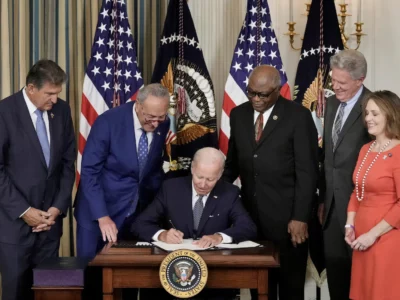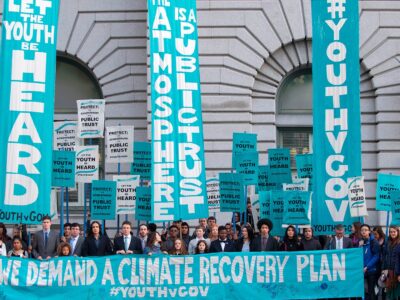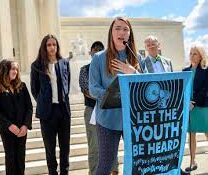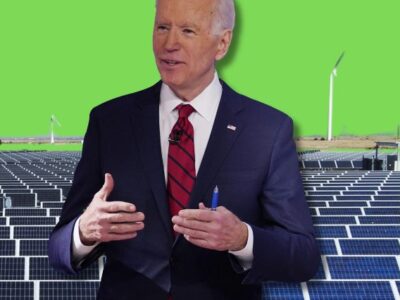Federal Climate Policy
I ♥ IRA
Yes, the IRA has flaws. But it was a really unexpected breakthrough for US climate policy.
Call me eccentric, but this is my Valentine to a federal statute, the Inflation Reduction Act, better known as the IRA. No one really expected IRA to pass. A version of the Green New Deal had passed the House. But the Democrats had only a one-vote margin in the Senate, and that one vote was …
CONTINUE READINGThe Unique Legal Context of EPA Methane Regulations
Three separate congressional actions intersect to support the regulations.
The government’s efforts to control methane have followed a complicated path, involving three different congressional actions: section 111 of the Clean Air Act, which allows EPA to regulate emissions of greenhouse gases; a congressional override of an earlier regulatory action; and a newer statute that creates a fee on methane emissions. The upshot is to …
Continue reading “The Unique Legal Context of EPA Methane Regulations”
CONTINUE READINGDr. King, Community, and Climate
Climate policy turns on an issue highlighted by Dr. King: Whose suffering counts?
“A genuine revolution of values means in the final analysis that our loyalties must become ecumenical rather than sectional. Every nation must now develop an overriding loyalty to mankind as a whole in order to preserve the best in their individual societies.” Those words are from a 1967 speech delivered at Riverside Church by Dr. …
Continue reading “Dr. King, Community, and Climate”
CONTINUE READINGJudicial Activism and Climate Change: An Unhealthy Combination
The trial judge in the Juliana case won’t give up, no matter what higher courts say..
An Oregon federal judge has convinced herself that climate change is a constitutional issue. After what promises to be a lengthy trial, Judge Aiken plans to decide whether U.S. energy policy passes constitutional muster. While I have no doubts about her sincerity and good intentions, her opinion itself shows why her courtroom is not the …
Continue reading “Judicial Activism and Climate Change: An Unhealthy Combination”
CONTINUE READINGElection 2024: Climate Action vs. Radical Deregulation
Voters should consider the radical, right-wing deregulation agenda that would await on Day One of a second Trump administration.
The Iowa Caucuses are 12 days away. The South Carolina Republican Primary comes 5 weeks later. And just two weeks after that is Super Tuesday. In the lead up to all these primary contests, anti-democracy candidate Donald Trump continues to march toward capturing the GOP nomination with a commanding lead in national polls. While headlines …
Continue reading “Election 2024: Climate Action vs. Radical Deregulation”
CONTINUE READINGMore Thrills and Chills Ahead! What to Expect in 2024
Here are the key events that will shape climate and energy policy.
We will face some important forks in the road in 2024 in terms of environmental law. Here are some of the upcoming forks. Who will be President in 2025? You probably don’t need reminding that 2024 is an election year. At this point, the election seems likely to be a replay of Biden versus Trump. …
Continue reading “More Thrills and Chills Ahead! What to Expect in 2024”
CONTINUE READING2023: The Good, the Bad, and the Ugly
Here’s what happened in the world of energy and environment.
A lot has happened this year, with political turmoil in the House of Representatives, indictments of Donald Trump and associates, and a close scrape with default on the national debt. In the world of energy and environment, the picture has also been mixed, but with more good than bad. The Good. California enacted two major …
Continue reading “2023: The Good, the Bad, and the Ugly”
CONTINUE READINGA Big Year on Legal Planet
Here are the 12 most popular topics in environmental law and climate policy on Legal Planet based on our most-read posts from 2023.
It’s an understatement to say that 2023 was a transformative year for the U.S. climate movement. We saw rapid implementation of landmark federal climate laws, a series of big actions on methane emissions, a deal on Colorado River water usage, and bigger-than-expected climate victories in Sacramento. EPA’s control of toxic chemicals was tested, the U.S. …
Continue reading “A Big Year on Legal Planet”
CONTINUE READINGThe Children’s Crusade
The latest climate lawsuit is well intended, but it’s almost certain to lose and could do serious harm.
The Children’s Trust has filed another lawsuit, one that gives me serious qualms. I know their hearts are in the right place, but I wish they had thought twice about filing this case. I struggle to find any benefit from the litigation. It has no apparent chance of success. Worse, it disparages people in the …
Continue reading “The Children’s Crusade”
CONTINUE READINGHow Will Americans Learn to Love the Inflation Reduction Act?
Pres. Biden has toured the country to sell his climate victories, but polls show it isn’t resonating yet with voters. Will Trump attacks help?
Last February, on the eve of the State of the Union, President Joe Biden embarked on a victory lap for his landmark climate laws. At the time, the White House was focused on explaining to the American people how the Bipartisan Infrastructure Law and the Inflation Reduction Act would boost jobs and lift the economy. …
Continue reading “How Will Americans Learn to Love the Inflation Reduction Act?”
CONTINUE READING












